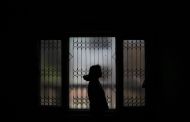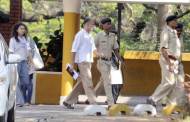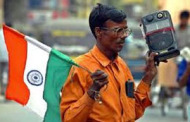New Delhi: Arvind Kejriwal’s rival in next month’s Delhi election is a London School of Economics graduate who fought her last election in college. Nupur Sharma, 30, the BJP’s candidate in the New Delhi assembly seat, says “this will be an election being fought to be won.”
Ms Sharma, a lawyer, is a member of the BJP’s youth wing, and a former Delhi University Students Union president. She calculates that this gives her seven more years of political experience on Mr Kejriwal, who launched his Aam Aadmi Party in 2012.
“If you are trying to say I am a scapegoat, no I am not. Mr Kejriwal won an election and ran away,” she told NDTV, offering it up as her biggest weapon against a rival who is widely believed to have been handed a walkover win by the BJP.
“When you betray people’s trust then it shows your own intention of serving the people,” she added.
Ms Sharma is one of the two names that drew maximum attention when the BJP last night released a list of 62 candidates for the February 7 Delhi assembly polls. The other prominent candidate is Kiran Bedi, who is contesting from Krishna Nagar.
In a departure from its template for other state polls, the party has named Ms Bedi as its chief ministerial candidate, a move that many say is the BJP’s assessment of a new kind of voters in Delhi, who don’t follow traditional election arithmetic.
“I think what the people today are asking for is one who is ‘karmath’ (who can work), somebody who sticks to their stand and somebody who is willing to deliver and definitely not willing to run away,” Nupur Sharma said.
Amidst great fanfare12th edition of the Standard Chartered Mumbai Marathon took place on an early Sunday morning… The marathon included the full Marathon (42.195 km) and the Half marathon (21.097 km), the annual event also included a corporate champions race, a police cup (for Mumbai Police), a dream run, a senior citizen’s run and a run for champions with disability.
The marathon starts opposite Chhatrapati Shivaji Terminus in Mumbai. It passes many of the city’s iconic locations such as Flora Fountain, Marine Drive, Chowpatty, Haji Ali, Mahim Church, and the Bandra-Worli Sea Link.
Ethiopians Tesfaye Abera, a rank outsider, and defending champion Dinknesh Mekash clinched the men’s and women’s titles respectively and the top prize of $41,000 in the12th Standard Chartered Mumbai Marathon on Sunday. Runner O P Jaisha, an Asian Games medallist in 1,500m and 5,000m events, made a memorable marathon debut on Sunday by breaking the 19-year-old national mark of Vally Satyabhama to qualify for the World Championships in Beijing later this year.bai Marathon on Sunday.
Many celebrities also participated in the marathon among them were Anil Ambani, John Abraham, Gul Panag, Rahul Bose were the first ones to arrive and also completed the entire marathon.
Mumbai Marathon is one of the richest race in India with a a prize pool of US $350,000. It can be said it is the biggest fund raising program in the Indian Sub continent. Tata, Sun Pharma, LIC, Mahindra and Mahindra participated in full force. Some were raising funds for the child education. Some were promoting their culture 9dressed in traditional attires and many were giving out social messages.
The participants were very enthusiastic to take part from all age groups young, old, male females. In terms of old a man of 80 years had also participated. Man received injuries but were quickly whisked away for immediate medical treatment. A full team of medical doctors were present at the medical camp. A Japanese runner had cramps and just could not stand. RNI editor Govind Ghimire suggested him to immediately go to the medical camp. He could not understand English but later was helped by his team mate.
In the event a lot of loitering was seen. Aam Admi Party volunteers were in full force sweeping and cleaning the area. We wondered where were the Swach Bharat Abhiyan volunteers. Is it just a publicity stunt?
Participating in the short distance run was War Wounded Foundation led by Retired lt Gen Vijay Oberoi. Speaking to RNI LT Gen Oberoi said the foundation help army personnel wounded in the counter insurgent and counter –terrorist activities. The disabled soldiers become productive citizens with the medical and financial help of the foundation. The foundation entirely runs on donations received by well wishers. It has no support of the government what so ever. General Dalbir Singh is the patron of War Wounded Foundation.
KATHMANDU (Thomson Reuters Foundation) – When Pooja Bohara heard that the two men who had dragged her into a toilet and raped her had been released from prison nine months ago, the Nepali teenager went into shock.
The men, who had been convicted and sentenced to 13 years imprisonment in March 2013, were acquitted by an appeals court last April due to a lack of evidence.
But despite being blamed and stigmatised by some in her community in western Nepal after reporting the rape, and forced to seek refuge in the capital, the 17-year-old says she is not giving up her fight for justice.
“Society and some family members blame me. My uncle even suggested that I should be placed in a heap of straw and burnt to death, but my father was for justice,” said Bohara, sitting in a rehabilitation centre in Kathmandu.
“It is not our fault that we are raped. Victims should come out and tell their story to the courts and seek justice.”
Growing awareness in Nepal of crimes against women has helped an increasing number of victims like Bohara to challenge a culture that often blames or shuns them into silence, say police and activists.
Reports of violence against women – including rape, domestic violence and molestation – soared to 7,847 for the year ending mid-July 2014, from 2,477 a year earlier, according to police figures.
“Women are now more aware of their rights than before and are courageously coming out and reporting crimes against them, including sexual violence, to police,” said Mingmar Lama, chief of a police unit that monitors violence against women.
TAX WAIVERS, WOMEN-ONLY BUSES
Wedged between China and India, Nepal is increasingly recognising the rights of women and other groups that suffer discrimination
Greater media attention on crimes against women, protests by civil society groups, women-friendly government policies and even political campaigns to rally the female vote have helped embolden women, say activists.
Awareness was further boosted after the massive public outcry in neighbouring India over the fatal gang rape of a young woman on a Delhi bus. The case hit global headlines and resulted in India tightening laws related to violence against women.
In Nepal, the government has introduced female-friendly policies such as tax waivers for women buying property, while police have established special units of women officers in the country’s 75 districts to encourage women to report crimes.
Earlier this month, women-only public buses were introduced in the capital Kathmandu to curb rising reports of sexual harassment and groping on public transport.
Despite improvements and greater awareness, most women still remain unaware of their rights and do not come forward to report crimes due to fears of stigmatisation, said Menuka Thapa, head of Raksha Nepal, the charity sheltering Bohara.
“Lack of education and economic empowerment of women also force women to remain silent,” Thapa said. “In many cases, women who suffer violence from their own family members are dependent on the family, so they cannot speak up.”
ROUGH JUSTICE
Mustering the courage to come forward and report violent crimes is just the first step in a long and often painful process to get justice.
Police are often insensitive and reluctant to register and investigate complaints, and a lack of judges and courts means trials can take up to a decade to reach a conclusion, said lawyer Swagat Nepal.
“There is no system in Nepal to give protection to the witness, yet there is pressure on victims to compromise with their abusers – even though such compromises are illegal,” he said, adding that the conviction rate for crimes against women was about 3 percent.
Laws to deal with rape and violence against women were archaic, categorised as provisions of a law dating back to 1854, he said, adding that a separate rape law must be drafted.
Meanwhile, Bohara is not waiting. The teenager has appealed to the Supreme Court, which is expected to hear her case later this month.
“The incident has totally affected my life. It was a turning point in my life,” said Bohara. “I want to study law and become a judge so I can seek justice for victims like myself.”
New Delhi: The voters in Sadar Bazar constituency of Delhi are in a dilemma on who to support in the Delhi Elections. While the Bharatiya Janata Party is yet to declare its candidate, the Congress has nominated the party election committee chief Ajay Maken and Aam Aadmi Party has named former MLA Som Dutt.
With not much hullabaloo till now over the one-day poll on February 7 for the 70-seat Assembly, the election fever has not yet caught up in this constituency. Only a few banners and flags of the political parties are seen in the main market and parties are yet to take up extensive campaigning.
On one hand the Congress is projecting Ajay Maken for his clean image while the BJP is banking on former IPS officer Kiran Bedi who is the party’s chief ministerial candidate. But the AAP it seems is at a loss from this seat as people are not very happy with Som Dutt.
“I have always voted for the BJP and will vote for it this time as well. No other party will form government here,” says s Sadar Bazar voter.
But there are many who do not exercise their franchise and celebrate the voting day as a holiday.
“I do not vote, but I enjoy the day as a holiday and spend time with my family,” says Nitesh Gupta of Gupta and sons.
As there has been no extensive campaigning, it has hit the business of those dealing with election campaigning material.
“There has been no demand of any election campaigning material as of now,” says Harpreet Singh of GV Traders.
Allahabad, Jan 19 (IANS) More than 80 lakh people are likely to take a holy dip at Sangam, the confluence of three rivers – Ganga, Yamuna and the mythical Saraswati in Uttar Pradesh – on the occasion of Mauni Amavasya Tuesday, an official said Monday.
Mauni Amavasya is one of the most crucial days for taking a holy dip during the 44-day Magh Mela here.
The district administration has tightened security around the area where people will take the dip, a district official told IANS.
The North Central Railways has deployed security personnel on foot overbridges and platforms.
Additional District Magistrate (city) S.K. Sharma Monday inspected the ghats and reviewed the preparations to receive millions of people Tuesday for Mauni Amavasya.
A 20-year-old man, identified as Iftikhar, out on bail in a case of alleged vandalism at a temple in Unnao three weeks ago, has once again been arrested by the Uttar Pradesh police for ransacking the furniture and burning religious books and prayer mats at a mosque in Azamgarh on Sunday.
The youth, during interrogation, told the police that he does such things “because he feels like doing it”. The police, though further probing the case, said Iftikhar appeared to be mentally unsound.
According to the police, when people went to offer early morning prayers at the mosque in Khapda village under Saraimeer police station area on Sunday, they found the furniture ransacked and religious books and prayer mats burnt. They also found a young man sleeping inside. They caught him and handed over to the police.
Police officials said some people gathered at the spot and tried to create trouble by blocking the road. However, the blockade was lifted soon after it came to light that the man was apparently mentally unsound. Additional police force was deployed as a matter of precaution.
“The situation turned normal once people realised that it was the handiwork of a youngster, identified as Iftikhar (20), a resident of Safiganj Kot, Unnao, who was not able to explain his behaviour. Investigations revealed that he had earlier indulged in a similar offence in a temple in Unnao district. He was arrested there and later released on bail. He has not even been able to explain as to how he reached Azamgarh. When asked why he is doing such things, he said he does it because he feels like doing it,” said Station Officer (Saraimeer), Tej Bahadur Singh.
Singh added that Iftikhar even claimed to have come under the spell of djinns. “We got in touch with his family. They confirmed his identity, but said they have nothing to do with him,” the SO added.
Circle Officer (Phoolpur), Satyendra Kumar Singh, said the youth has not been able to explain anything coherently about his background. “We have got his antecedents checked from Unnao police. There too, he had carried a similar act and then could not explain his act. As far as we are concerned, he is mentally unsound. Further investigations are on”.
The police have registered a case against Iftikhar under Sections 295 (Injuring or defiling place of worship with intent to insult the religion of any class) and 427 (mischief causing damage) of the IPC.
New Delhi, Jan. 17 (ANI): Twenty four children, including eight girls, will be given National Bravery Awards for the year 2014.
Four of these awards will be given posthumously.
The Bharat Award has been conferred on sixteen-and-a-half-year-old Resham Fatma of Uttar Pradesh, an acid attack victim, who displayed outstanding courage while fighting off her tormentor.
The Geeta Chopra award has been conferred on thirteen-and-a-half-year-old Gunjan Sharma of Assam who displayed valour in saving her friends from the clutches of an abductor.
The children will receive their awards from Prime Minister Narendra Modi on January 24, and will also participate in the Republic Day parade.The awardees will receive a medal, certificate and cash.
The National Bravery Award Scheme was initiated by the Indian Council for Child Welfare to give due recognition to the children who perform outstanding deeds of bravery.
Since the inception of the scheme in 1957, the ICCW has given awards to 895 children. (ANI with inputs)
The Supreme Court on Friday stayed for three weeks the trial in a sexual assault case against Tehelka founder editor Tarun Tejpal as he opposed proceeding in the case without providing him the necessary documents.
A bench led by Chief Justice H L Dattu asked the trial judge to make sure that prosecution supplies all the relevant documents to Tejpal within three weeks. It also asked Tejpal to refrain from delaying the trial on any ground in future.
The petition, filed by advocate Sandeep Kapur, had contended that the session court while passing the December 23, 2014, order was conscious of the “recklessness” shown by the prosecution to uphold statutory requirements that are obligatory to provide all necessary documents.
It also claimed that the prosecution had deviated from procedure and failed to appreciate that speedy trial was barely a facet of fair trial. The petition alleged that the court has not reprimanded the prosecution for its “deliberate non-compliance, for deviating from the statutory mandates” to the detriment of the petitioner and his right to fair trial.
“That the petitioner has established a good prima facie case on merits and the balance of convenience tilts overwhelmingly in favour of the petitioner. The impugned orders have been passed by the trial court without consideration of the cardinal principle of law. Therefore, it is just, proper and expedient that the interim relief as prayed for may kindly be granted in favour of the petitioner. Grave and irreparable harm and injury would be caused to the petitioner, in case interim orders as prayed for, are not granted,” the plea said.
The Tehelka chief has sought stay of the operation of the December 23 order of last year passed by Additional Sessions Judge, Mapusa, Goa who will go ahead with arguments on framing of charges. Tejpal has been chargesheeted for allegedly raping, sexually harassing and outraging the modesty of a junior colleague during an event at a Goa hotel in November last year.
He was arrested on November 30, 2013 and is presently out on interim bail. He has been accused of sexually assaulting the victim on November 7 and repeating the offence the next day. Before being released on interim bail, he was lodged at Sada sub-jail in Goa’s Vasco town.
A secret US cybersecurity report warned that government and private computers were being left vulnerable to online attacks from Russia, China and criminal gangs because encryption technologies were not being implemented fast enough.
The advice, in a newly uncovered five-year forecast written in 2009, contrasts with the pledge made by David Cameron this week to crack down on encryption use by technology companies.
In the wake of the Paris terror attacks, the prime minister said there should be no “safe spaces for terrorists to communicate” or that British authorites could not access.
Cameron, who landed in the US on Thursday night, is expected to urge Barack Obama to apply more pressure to tech giants, such as Apple, Google and Facebook, which have been expanding encrypted messaging for their millions of users since the revelations of mass NSA surveillance by the whistleblower Edward Snowden.
Cameron said the companies “need to work with us. They need also to demonstrate, which they do, that they have a social responsibility to fight the battle against terrorism. We shouldn’t allow safe spaces for terrorists to communicate. That’s a huge challenge but that’s certainly the right principle”.
But the document from the US National Intelligence Council, which reports directly to the US director of national intelligence, made clear that encryption was the “best defence” for computer users to protect private data.
Part of the cache given to the Guardian by Snowden was published in 2009 and gives a five-year forecast on the “global cyber threat to the US information infrastructure”. It covers communications, commercial and financial networks, and government and critical infrastructure systems. It was shared with GCHQ and made available to the agency’s staff through its intranet.
One of the biggest issues in protecting businesses and citizens from espionage, sabotage and crime – hacking attacks are estimated to cost the global economy up to $400bn a year – was a clear imbalance between the development of offensive versus defensive capabilities, “due to the slower than expected adoption … of encryption and other technologies”, it said.
An unclassified table accompanying the report states that encryption is the “[b]est defense to protect data”, especially if made particularly strong through “multi-factor authentication” – similar to two-step verification used by Google and others for email – or biometrics. These measures remain all but impossible to crack, even for GCHQ and the NSA.
The proposal for auctioning for phase III of FM channels was given a go ahead by the government today, a process that could add an estimated revenue of over Rs 550 crore to the exchequer.
The Union Cabinet, chaired by Prime Minister Narendra Modi also approved migration (renewal) of private FM Radio licenses from Phase-II to Phase-III in 69 existing cities for 135 channels on payment of migration fee according to TRAI recommendations.
As of now, with the implementation of two phases of private FM Radio — Phase I (1999-2000) and Phase II (2005-06) — there are 243 private FM channels in operation in 86 cities of the country, spanning 26 states and three Union Territories.
“The auction process will add an estimated revenue of over Rs 550 crore to the national exchequer on successful auctions of all proposed channels,” an official statement said here.
Besides, it will beget the amount realised through the migration process which is dependent on the TRAI recommended formula, where migration fee is linked with the discovery of market prices through the FM Radio Phase III auction.
The roll out of the first batch of FM Radio Phase III auction will provide more channels to listeners with richer content in 69 existing cities, the statement said.
















Recent Comments